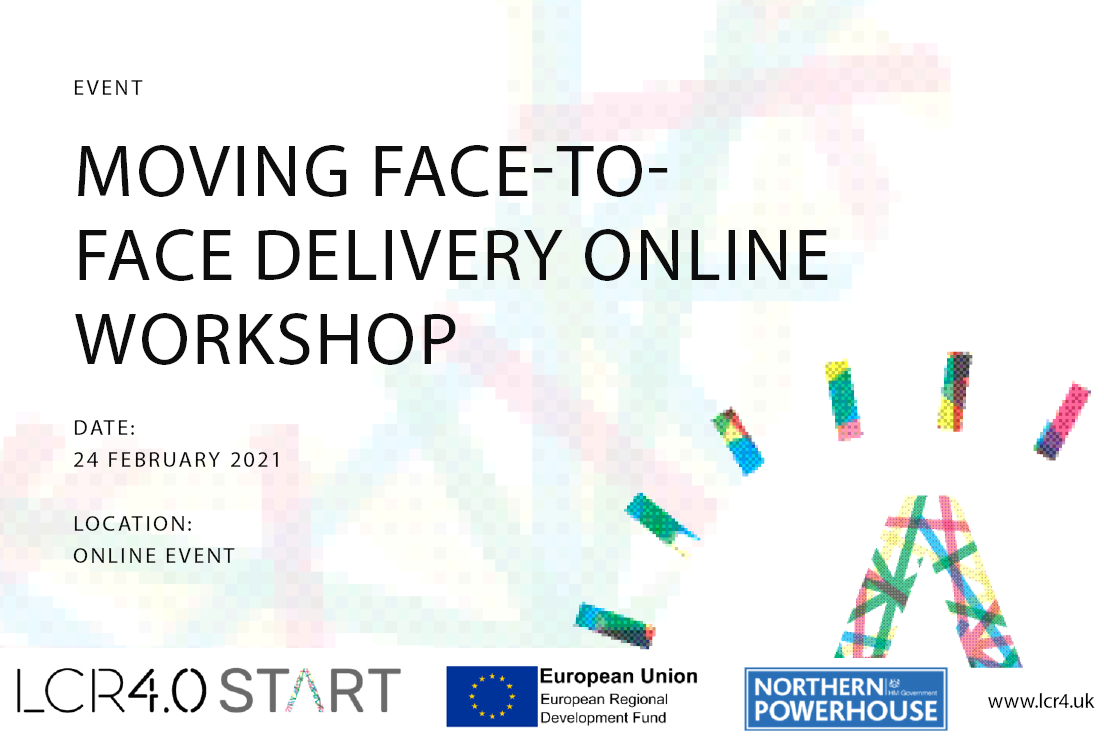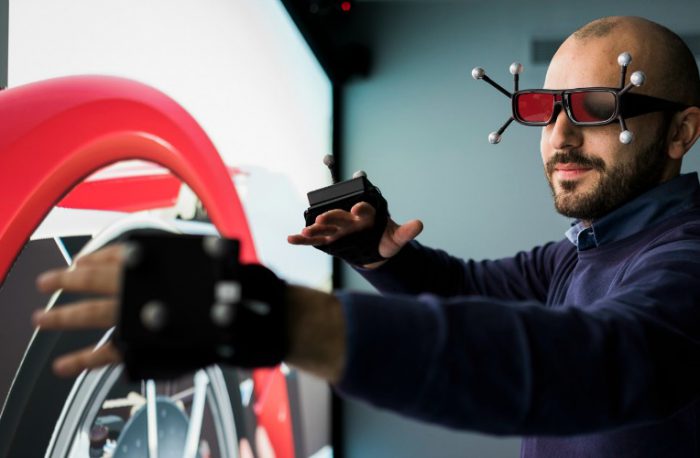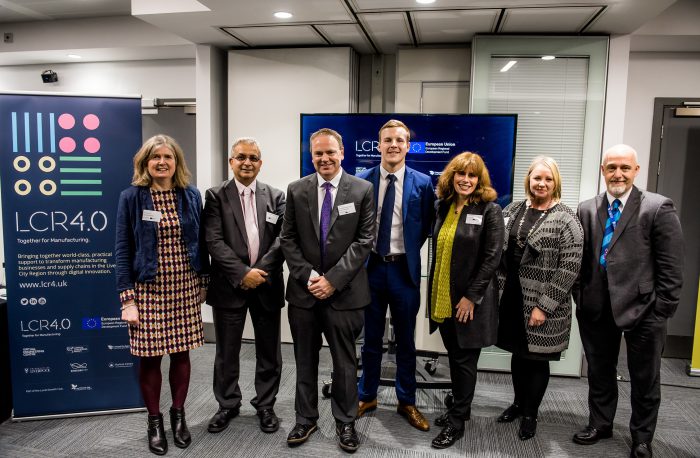Moving Face to Face Delivery On-line Workshop Summary

On Wednesday 24th February 2021, the LCR4 START team at LJMU ran an online workshop, exploring business challenges for using programmes such as Microsoft Teams and Zoom during lockdown restrictions.
LCR4 START is a European Regional Development Fund initiative, supporting Liverpool City Region SME business leaders and companies to gain a competitive edge through the development of practical strategies for effective digital adoption. It provides insight, guidance and demonstration of good practice to accelerate SMEs along their digital journey.
Since the start of the pandemic in early 2020, government guidance advised us to stay at home and remote working has become the “norm” for most people. The LJMU LCR4 START team delivered a workshop to explore the challenges businesses are facing and provided demonstrations of some of the technology that is being used by local businesses to deliver their business on-line. The discussions focused on how businesses have adapted and what the impact of using technology has been in their business.
The workshop identified several challenges including the ‘digital divide’ where technology is sometimes considered inclusive, yet is seen as limited in certain areas.
The event consisted of several companies and organisations, openly discussing their challenges, presentations of several demonstrations and digital solutions from local technology providers were given, following on with networking opportunities, which was an opportunity to build relationships and start collaborations.
Participants included:
- Dr Hoshang Kolivand and Hessam Restegari – PhD Project, LJMU
- Dr Dave Tully, Scenegraph Studios
- Christine Vaudrey, YogaBots Ltd
- Chris Morland, Citrus Suite
- Dr Thomas Hughes-Roberts – LJMU
- Dr Liang Men, Liverpool John Moores University (LJMU)
- Natasha Sutton, LJMU Business Clinic
- Dr Jan Brown, Liverpool Business School, LJMU
- Simon Sloan, Hi Impact
LCR4 START Partners included:
- Lesley Lambert – Liverpool John Moores University (LJMU)
- Eve Money – Liverpool John Moores University (LJMU)
- Daniel Bradley – Virtual Engineering Centre (University of Liverpool)
- Danielle Carrington – Growth Platform
- Angela Walsh – Science and Technology Facilities Council (STFC)
Chris Morland, Citrus Suite
Citrus Suite provides design and development services to organisations lacking the skills or capacity to build their own software. Since 2008 the Liverpool based Citrus team have deployed over 100 premium quality digital solutions for clients who range from global blue chips to SMEs.
Initially there was a degree of panic around whether existing clients would be able to complete projects but it was fortunate that their work was unaffected, building technology to specifically look at conferences and events and new solutions to take them on-line. There was not too much impact to the work, the most challenging was the increase in the number of enquiries. There were less people who had a firm idea of what they wanted to do, they were looking for digital solutions, with no idea of how much it would cost, how to commercialise the products, ROI and there was a need to educate people. Citrus Suite have always been known as an App Development company, however you don’t actually need an App. People have been looking to develop an App as a start-up business venture but this is not a solution.
The business grew within Health & Wellbeing sector, Citrus Suite have been building solutions to bridge the gap between the hospital and home using a web portal to undertake consultations, advice and guidance for patients.
The Citrus Suite platform was used to create the YogaBots product, they have the ability to scale the business and increase the volume of projects and number of clients that can be supported. It is an App building platform allowing them to cherry pick existing features and customise them for each customer.
Christine Vaudrey, YogaBots Ltd
Christine Vaudrey has been a yoga teacher for over 20 years, alongside her day job. She had been playing with the idea of on-line yoga sessions for over 12 months and exploring the concepts of AR and VR. Christine developed the YogaBots app in partnership with Citrus Suite, as a response to physical and mental health and wellbeing, but Christine wanted everything to be perfect and was reluctant to launch the App. However, demand was increasing and there was greater need due to the pandemic, there was a gap in the market which increased workplace stress, anxiety and depression. The time was right to increase on-line services and YogaBots was ready to go. The understanding of the market and target audience need was important and helped shape the model.
The aim of YogaBots is to raise awareness of basic tips and techniques that help to address mental and physical health and wellbeing and eventually use profits from business subscriptions to support free children’s mental health and community wellbeing projects. There is potential to increase subscriptions, business model can be global app.
Dr Thomas Hughes-Roberts, LJMU’s LIVE Lab
The LIVE Lab provides cutting-edge facilities for the development and delivery of usability research through immersive, virtual, mixed and augmented reality technologies. A platform for studying human behaviour with a focus on immersive technology. There is a natural need to understand how people react in these environments.
Eye tracker is popular with industry, commonly applied piece of equipment. A recent study was using a pair of glasses to understand how people with dementia interact with their home. A virtual world can also be used to measure customer interaction with products, understand how people respond to the look, feel and environment.
It is difficult to measure the impact human interaction has with technology. You really need access to the person but analytics can be used to measure outcomes. The LIVE Lab captures user ability, but there is no way to gauge personal and interpersonal reactions online; how do you know when people lose interest as you have less control over the environment and are unaware of the distractions in the environment? You can use Face Reader technology to track emotions and combine a number of measures to understand the reactions.
Attendance at lectures can’t be measured in the same way, the way people engage is changing, it is a more flexible and dynamic approach to people consuming content. You need to use as many methods of communication as possible.
Dr. Liang Men, Lecturer at LJMU School of Computer Science and Mathematics
Dr Liang Men’s research interest lies in collaborative and social VR. He has a few research projects in collaborative VR (check www.menliang.ml for more information). In this demonstration, he was able to show how a free online VR social platform — AltSpaceVR can be used to arrange meet-ups and presentations in the virtual world. A step by step tutorial is available (shorturl.at/auvAK) if you want to use AltSpaceVR to organise events in VR.
VR has great potential in the future and will have an impact on how it is used within meeting, providing 3D interaction. LeMo multi player, a shared virtual reality environment enabling users to share and work together. Different configurations have been used to study how users manage and utilise the space.
Dr Dave Tully, Scenegraph Studios
Dr David Tully, previous academic in Computer Game Technologies, now runs Scenegraph Studios, a Creative Immersive Experience development company, specialising in software development, Virtual Reality, and Augmented Reality, providing his knowledge to companies who require creative strategies and in-house technologies. Scenegraph Studios help people to bridge the gap between people and technology, taking care of the technical side of the business. Creative technicians using VR, AR, gaming and other technologies to build products to sell.
Pitch4D-Interactive Presentations is a recent development and delivers a cloud based rendering platform for Pitch4D to alleviate the need for on-site expensive hardware relating for highly realistic rendering.
Tracy Fishwick, Managing Director of Social Enterprise
Transforming Lives usually works with long term unemployed and more recently due to the pandemic, has noticed a shift to working with lots more people who have recently found themselves unemployed. Youth unemployment is also an issue, so how do you engage with these people when you are unable to meet face to face? Everything they did, used to be face to face and Dave’s demonstration raised the question around the challenges, perceptions and belief that this technology isn’t for us! However, you can create real interview experiences and virtual tours of the workplace using this type of technology and Scenegraph Studios and Pitch4D provides access via the cloud, removing the need to purchase expensive, hi spec hardware, you just need to log on and can stream anywhere by opening a link in a web browser. Help you “try it out” before investing in the technology.
Dave knows that going on-line has pushed 3D technology, the audience needs to be engaged and if not interested in 2 seconds they lose interest. Fast content, instant engagement is key – pushing the boundaries.
Simon Sloan, Hi Impact
Hi-impact has over a decade’s experience in supporting businesses with digital solutions and the session highlighted a few ideas that can be used to digitise your delivery using engaging, interactive experiences, whether it is for training, inductions, education, showcasing or marketing. They use high grade equipment and software to ensure delivery is professional and have a live studio that can be used by clients to develop content, such as teachers engaging with school children. Videos can be embedded and you can also create virtual people.
Further development for Virtual Exhibitions is underway and exhibitions stands, such as Chester Zoo, using web links, virtual tours can be embedded into websites for people to interactive with. There are benefits for virtual events; there is no travel time, logistics and availability is more flexible and can be cost effective. The time is right, on-line content is essential and needs to be up to date.
Dr Hoshang Kolivand and Hessam Restegari, LJMU School of Computer Science and Mathematics
Dr Hoshang Kolivand has a background in 3D Maths & Computer Graphics in particular AR/VR, 3D visualisation, immersive technology & human Computer Interaction. Hessam, his prospective PhD student started with his experience in programming for various platforms, graphic designing and also network and security.
They are currently working with a local SME through LCR4 START using Augmented Reality to give “a soul” to an amazing psychological booklet and create a MagicBook. This app is able to make a unique connection between psychologists and people (or patients). It is more than a simple imagination in mind, using many 3D-Objects are used within the booklet to show the details of psychologist’s thoughts and aims. This app is powered by Vuforia Engine on Unity platform and programmed to create visual effects, shaders, actions, interactions, animations and live connection out of the app. This app uses some technologies like Image Tracking, Virtual Buttons, Gesture Recognition, Dynamic RealTime 3D-Models and more.
For the full event recording, please click here.
For more information on this event, or to get in touch with any of the presenters and attendees, please contact us: hello@lcr4.uk
Explore more

VEC: Demonstrating the virtual reality of manufacturing
Technical Director at the Virtual Engineering Centre and Technical Lead at LCR 4.0, Dr Andy…

Liverpool’s manufacturers urged to embrace innovation
Innovative SMEs will be critical to the success of the next industrial revolution which is…

Gender Balance Q&A: Emma Green
The Virtual Engineering Centre (University of Liverpool) Stakeholder, Compliance and Impact Officer BACKGROUND I…